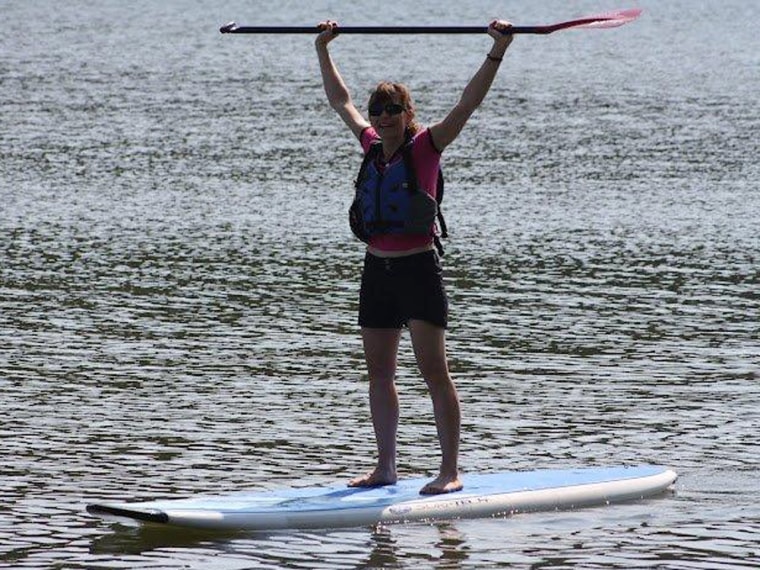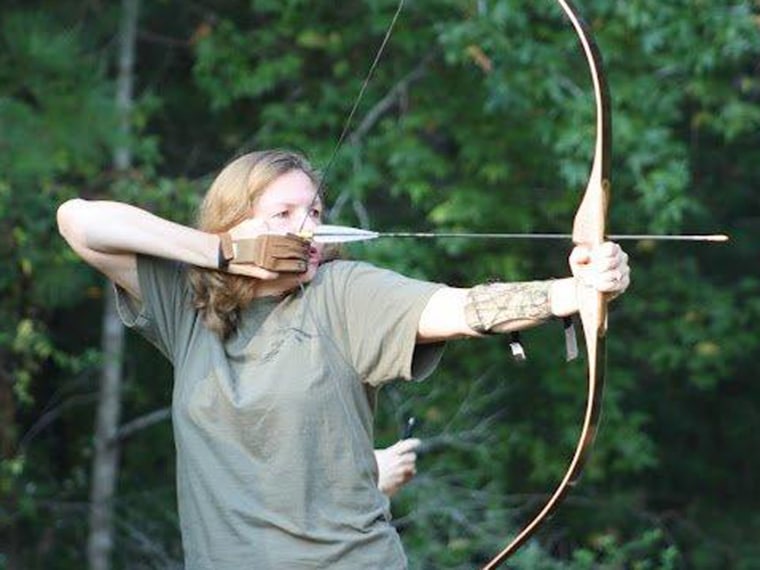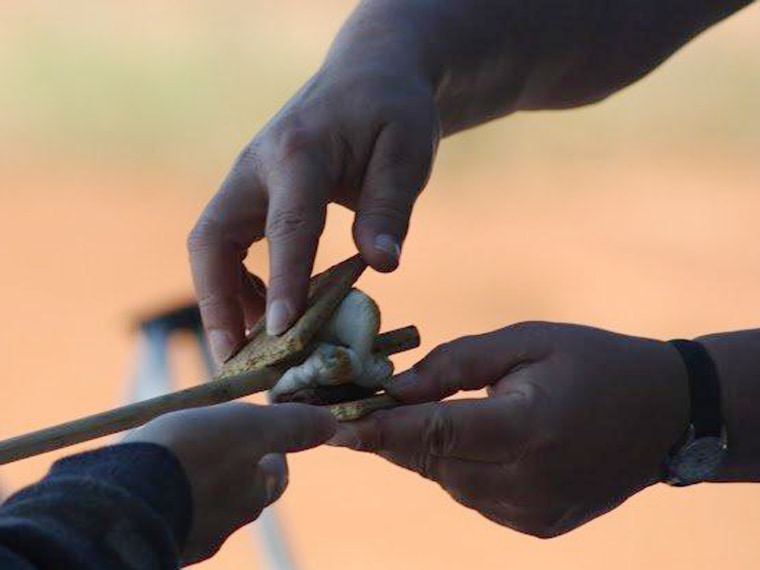
“Do the Warrior!” someone shouts at Barbara Teusink as she paddles out into the lake. Teusink has led our class of nine women in trying new things on the stand-up paddleboards on a sunny Saturday morning. Teusink obliges, running through a series of yoga poses on the blue-and white paddleboard.
We are all clapping and cheering as each new participant wobbles and then stands up on the boards. No trash talking here – it’s all about support at the South Carolina Wildlife Federation’s annual women’s retreat. She’s definitely outdone me – I had to trade the first paddleboard for a wider, more stable one before I felt confident enough to stand up.
But that’s OK. We’ve all traded our day jobs for a three-day weekend acting like a bunch of kids at camp. But kids and husbands are definitely not invited, and it makes for a snark-free zone, even if it wasn’t a snake-free zone. (More on that later.)
“She’s got twitchy knees now,” Jesse Koch of River Runner Outdoor Center in Columbia says as he watches Jackie Roberts stand up on one of the boards he has brought for the campers to try. “She’ll get confident in a minute.” And, like all the other mostly middle-aged women in the class, she does.
"We tend to live our lives in a safe, sheltered space, often not of our choosing," Roberts, a 58-year-old retired telephone technician, says. "We speak with the same people and engage in the same activities day after day. Not that that is bad. But, every now and then it is a good thing to swing your panties over your head and give a rebel yell with the girls."
The retreats have been run by the Wildlife Federation for more than 20 years as a way to get women to enjoy the outdoors. “We just want to encourage women to get outside and learn some new skills without having a man look over their shoulders,” says Sara Green, director of education for the Federation and organizer of the event.
About 160 women attended this year’s camp, held Sept. 21-23. We had a long list of activities to choose from, most taught by local experts, from archery to kayaking, basket-weaving and sailing. The approach is deliberately low-key and while a few of the women taking part appear athletic and outdoorsy, most of us are not.
I’ve been invited by my friend Mary Denis Cauthen of Columbia, S.C, who, like many of the women, wants a like-minded companion to share the adventure.
The retreat provides an opportunity to dump the cars and walk through the woods and along the shore of Lake Thurmond, on the border between South Carolina and Georgia.
“I think it is intimidating to a lot of women. They might not want to branch out and learn too many new things and ask too many questions,” said Green, who tried paddleboarding for the first time herself this year.

The instructors offer plenty of criticism but it’s larded with encouragement. It works.
“You get that bow up, draw it, aim it, take your shot,” says Jerry Garvin of Stone Point Archery as he watches Cauthen pull back the string on a long bow. The mist is still rising off a newly mown field of grass at Hickory Knob State Park as we gather in front of the targets, which include six plain bags, two foam deer and a little black foam pig. The women are clearly divided between those who don’t want to shoot even a pretend animal, and those who really, really do. Cauthen reluctantly chooses the pig.
“It’s easier than you think,” Garvin promises, and he’s right. A few arrows fly by the targets, but she gets the pig on her second try. Everyone smiles broadly as they retrieve their arrows. "I'll do this again," Cauthen says, taking Garvin's business card.
Each class offers just a taste of an activity. "It is not like signing up for a tennis weekend and finding out 10 minutes into the lesson that you HATE tennis," Roberts says. "The classes generally last 1 1/2 hours so you can handle that with a smile, regardless of how much you dislike the course. Plus, there are other women with diverse backgrounds that you can speak with and learn from."
Roberts has attended the retreat for the past four years and said she was nervous about her bad knees, but was game enough to take on the paddleboarding.
"Some one of the ladies are brave and strong and some are a bit timid. I have always enjoyed helping the timid ones overcome their fears," Roberts, from Aiken, S.C., says.

“A lot of the women are really just excited to try new things,” Green says. “A lot of the women also take the same classes year after year. We see people who are just happy to be away from home and sit back and other women who jump in and try as many things as they can.”
Teusink, from Chapin, S.C., is in the latter group. She’s run from archery to paddleboarding, and got in some extracurricular geocaching along with instructor Michele van Patten. Geocaching is a game played with GPS devices in which participants hide various objects for others to find using latitude and longitude, along with a few hints. Saturday night’s hunt got Van Patten and Teusink out on a seven-mile hike in the woods, with me and Cauthen tagging along.
“Geocaching gives me a reason to be outside,” Teusink says as she races along a lakeside path to try to find as many caches as she can before the sun sets. Although she sets a punishing pace, the sun disappears before we can find the last two caches.
Here’s where a little Girl Scout training would have come in handy. Focused on finding as many caches as we could, we broke every single rule of woodcraft – we didn’t have a map, we didn’t calculate the time properly and we weren’t wearing the right footwear. Those GPS devices show precise latitude and longitude but not topography. Caught in the dark with more than three miles left to go, we use flashlights and smartphone flashlight apps to make our way home. I feel a scratch on my sandal-clad foot as I step over a log and curse what I think must be a stickery smilax vine.
Later, after making up for a missed dinner with sandwiches in the park’s hotel, I examine the scratch. It’s beginning to swell and looks for all the world like a snakebite. When I show it to the duty park rangers, they nod vigorously. The verdict: a copperhead bite.
Evidently, the snake didn’t inject any venom or I would have known for sure the moment I was bitten, the rangers (and an Internet search later) assure me. Copperhead bites, while very painful, are usually not serious. Nonetheless, my ankle swells impressively and by the next morning everyone in the morning nature walk wants to see it. The biologist leading the walk assures me that any decent pair of shoes would have deflected the bite and I would never have even known about my close encounter with the snake.
Not every activity is such an adventure. Kudzu basketry is also filled to capacity with women eager to learn how to turn a common garden weed into something useful. Laura Roscoe of Hartsville, S.C. put her husband to work chopping a truckload of the “vine that ate the South”. Women dive into the pile of brown, twisted vines, some as thick as a finger.
“Now hold on to it like it’s Saturday night and it’s your husband and he’s come in late,” Roscoe instructs. “Grab it hard. It’s not rocket science, I promise you.” Nearby, another group of women carves flutes from wood. A blast makes everyone jump – it’s the Civil War re-enactors, who have shown up in full period uniform with a real cannon that they fire over the lake.
Roscoe, a 55-year-old bank teller, is full of folksy advice for her students. “Always keep your first basket,” she counsels, praising even my hideous effort. “With each basket, you’ll learn something, and you’ll learn something about yourself.”